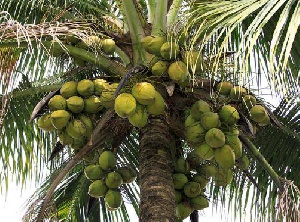- Home - News
- TWI News | TV
- Polls
- Year In Review
- News Archive
- Crime & Punishment
- Politics
- Regional
- Editorial
- Health
- Ghanaians Abroad
- Tabloid
- Africa
- Religion
- Election 2020
- Coronavirus
- News Videos | TV
- Photo Archives
- News Headlines
- Press Release
Business News of Friday, 13 December 2013
Source: B&FT
Coconut farming at Ayisakro dying slowly
Coconut farming is dying slowly in Ayisakro in the Nzema East District of the Western Region.
The reason: The farmers say their plantations which were destroyed by the Cape Saint Paul Wilt Disease over 20 years ago, cannot find a new variety of seedlings to plant
A variety given to them in 2001 and 2002, by agricultural extension officers could not help them. They have threatened to venture into rubber plantation it their problem is not addressed
Mr. Samuel Cobbinah, Chairman of Ayisakro Co-opearative Coconut Oil Producers and Retailers Society at a sensitization programme with support from Business Sector Advocacy Challenge Fund noted that the prevalence of the coconut disease is a challenge to the association.
“This issue is resulting in post-harvest losses as a result of the inability to get a cure for the disease –all efforts by the coconut farmers to get extension officers to come to our aid have proved futile”, he said.
He pointed out that this challenge is leading to low income which is making it difficult to sustain livelihoods of farmers and their dependant – thus reducing yield per acre and this is negatively affecting total productivity.
“Already, some of the coconut farmers have gone into rubber plantation which is lucrative and also takes six years to mature”, he added.
Mr. Samuel Agyepong, the Chief Technical Officer of Coconut Development Unit of the Ministry of Agriculture in an interview with B&FT explained that the ministry has introduced a new seedling which is resistant to the Cape Saint Paul Wilt Disease.
He explained that “Srikan Dwarf has been used to cross Vanutu” the new seedling - this is to replace the old coconut in the system which were attacked by the CapeSaint Paul Wilt Disease years ago.
He said already, some coconut farmers at Ellembella and Shama in the Western Region as well as some farmers in the Central Region are benefitting for the new seedling which is on pilot basis.
“It is expected that within the next five years, about 1,200 hectares will be planted in the coconut growing areas in the country which will yield and be fruitful”, he said.
Therefore, he advised farmers who want to go into re-planting of coconut to see the Agric Officer in their area –the extension officers will supervise them in the planting of the seedlings from time to time.











